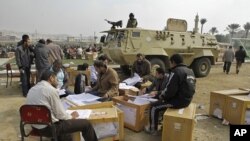Results from the first round of Egypt's parliamentary elections are now expected Friday, after a number of technical glitches slowed down official tabulations. Islamist groups including the Muslim Brotherhood are expected to have a strong showing, although the lengthy voting process means a final tally won't be known until January.
The party formed by the Muslim Brotherhood, Egypt’s mainstream Islamist group, have reportedly taken about 40 percent of the vote, as expected.
The big surprise was the strong showing of ultraconservative Islamists, called Salafis, many of whom reject women’s participation in voting or public life.
Analysts in the state-run news media said early returns indicated that Salafi groups could take as much as a quarter of the vote, giving the two groups of Islamists combined control of nearly 65 percent of the parliamentary seats.
Abdel Rahman al Barr of the Muslim Brotherhood's Executive Bureau says that he expected Brotherhood candidates to win 75 seats in the first round. He noted, however, that it is still too soon to draw definitive conclusions, since two more rounds of polling have yet to take place:
He says we still have two more stages to go with more than two-thirds of the voting still to be accomplished, so the die is not cast.
Middle East scholar Fouad Ajami of the Hoover Institution says that it would be a mistake to read too much into a Muslim Brotherhood victory.
"So, they have won the first ballot, the MB, and if indeed they come to govern, which has always been their dream since 1928, in some kind of vague alliance with the military, so be it. Let's see what they can do,” said Ajami.
He says that many in the West are worried about the apparent Islamization of the Arab Spring, but he is taking a more wait-and- attitude before drawing any conclusions:
"Let these Islamists, whether in Morocco or Tunisia or Egypt....let them win. The first election will favor them, and let's wait," Ajami said. "Now that means another what, two years, four years, whatever many years. Then we'll see what the political universe looks like.”
Many political observers in Cairo, however, worry that time will not play in favor of democracy because the economy is slowly deteriorating. Egypt subsidizes bread, sugar and other food items, leaving some to fear instability when the hard currency runs out. Ajami argues that such a crisis will put the Muslim Brotherhood, which has a reputation of looking out for the common man, to the ultimate test.
Heba Morayef of Human Rights Watch provides analysis of Egypt's Muslim Brotherhood:
| Join the conversation on our social journalism site - Middle East Voices. Follow our Middle East reports on Twitter and discuss them on our Facebook page. |




